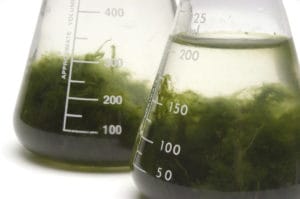DHA Omega-3 Oils in Food = Proven Beneficial by Scientific Research
DHA from Mutated Algae by DSM/Martek Biosciences = Unproven and Risky
Written by Charlotte Vallaeys
Farm and Food Policy Director, The Cornucopia Institute
To our amusement, someone in the organic food industry called The Cornucopia Institute an “anti-DHA group.” Yes, it is true that we have, for years, challenged the addition of factory-produced algal oil as a source of DHA, a healthy omega-3 fatty acid.
 Martek Biosciences Corporation, now owned by the $12 billion Dutch multinational conglomerate Royal DSM, produces the patented algal oil, “Life’sDHA™”, that is being illegally added to organic foods.
Martek Biosciences Corporation, now owned by the $12 billion Dutch multinational conglomerate Royal DSM, produces the patented algal oil, “Life’sDHA™”, that is being illegally added to organic foods.
To produce its algal oils, DSM/Martek used techniques such as genetic modification, involving radiation and harsh chemicals; fermentation of the algae in conventional, GMO corn products; extraction with synthetic petroleum-derived solvents such as hexane or isopropyl alcohol; and mixing the oil with synthetic preservatives.
Their oil is then added to conventional and organic foods, including organic infant formula by Earth’s Best and Similac, and “organic” milk from Dean Foods’ Horizon label. These companies then proudly profess on their packages that the product contains the healthy nutrient DHA, and often adds the “Life’sDHA™” logo.
To this day, algal oil does not appear on the USDA’s list of non-organic ingredients that are legally allowed in processed organic foods—and the USDA has ignored federal law by not forcing its removal.
Yes, we admit we have a problem with this source of DHA being added to organic foods.
But does that mean that we are “anti-DHA”? Of course not! At The Cornucopia Institute, we believe that the best source of nutrients is …. food. Real food. Organic food.
We believe in food produced sustainably and responsibly: plants grown in rich and healthy nutrient-dense soil on diverse organic farms; animals that live outdoors where they eat a natural diet, dining on fresh pastures, rather than being raised in feedlots on a concoction of corn, soybeans and synthetic nutrients; and wild fish harvested sustainably and responsibly.
It should come as no surprise that scientific research shows that these foods produced under traditional organic management are also healthier. These peer-reviewed, published studies show these foods (pasture-based meat, poultry, milk and eggs) contain higher levels of nutrients, including beneficial fatty acids like DHA.
For example, in the 1990s, a scientist specializing in omega-3s at the National Institutes of Health tested eggs from pastured hens whose diet included insects, worms and greens from pasture. The results showed that the eggs from the free-ranging hens contained twenty times more omega-3 fatty acids than standard supermarket eggs.
The free-range eggs also had a better-than-ideal ratio of omega-6 to omega-3 fatty acids while the conventional eggs had a dangerously lopsided ratio – too many omega-6 fatty acids and far too few omega-3s. Research suggests that the ratio of omega-6s to omega-3s may be more important to overall health than simply the number of grams of omega-3s a person consumes.

The same effects on the omega-6 to omega-3 ratio have been found in dairy foods, meats and fish: when the animals eat fresh greens, the original source of omega-3 fats, they produce foods that contain much healthier levels and ratios of omega-3s, including DHA. Foods like salmon and buffalo have historically been touted as containing healthy fats, but this is likely because, before grass-fed beef made a comeback, these were some of the last foods available from animals that actually ate a wild and natural diet of greens – algae for the wild salmon and grasses for the buffalo.
Give a cow as much green pasture as it desires, and its meat and milk’s omega-3 content increases substantially. In contrast, confine salmon to an aquatic feedlot with feed of corn and soybeans instead of algae, and its omega-3 levels will plummet (as will levels of other healthy nutrients that give its flesh its signature salmon color – which is why farm-raised salmon now carries the label “added color”).
We believe that organic foods that claim to be high in certain nutrients – like organic milk high in DHA – should make those claims not because they have added factory-produced supplements like Martek’s algal oil, but because the food has been produced in a way that led to higher levels of naturally occurring nutrients and a healthier ratio of different types of fats.
When companies like Dean Foods raise thousands of dairy cows on Horizon’s industrial-scale dairies and then sell their milk as “organic” with added DHA algal oil, they place the family farmers who maximize grazing their animals at a competitive disadvantage. This is especially true when consumers are led to believe that the omega-3 content of the factory-farm produced milk with added algal oil is actually as healthy as the grass-fed milk with naturally occurring omega-3s.
Organic consumers care about the source and quality of their food. If a food claims to be high in omega-3s, or lists specific fats such as DHA, we hope shoppers will question the source.
Are the fats proven efficacious, naturally occurring, produced by an animal that ate green plants? Or were they developed in a laboratory using genetic modification, then produced in a factory using GMO corn, synthetic solvents, and finally added to the food in a processing plant where the “Life’sDHA” logo was slapped on the carton?
The winner should be clear: real, nutrient-dense, certified organic food. The payback for your family, in health, nutrition and flavor, will be unparalleled.

